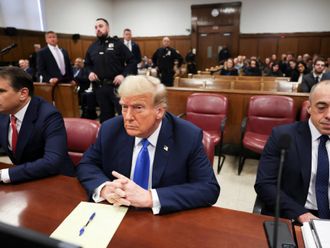BRASILIA:
Street protests and controversy over the absence of female ministers clouded Brazilian acting President Michel Temer’s political honeymoon on Monday as he began his first full week in power.
Temer took over from president Dilma Rousseff last week after the Senate voted to open an impeachment trial on charges that she illegally manipulated the budget.
The 75-year-old centre-right leader has vowed to reverse Rousseff’s leftist course in an attempt to haul Brazil back from its deepest recession in decades.
Though a cabinet — which will be reduced from a bloated 32 ministries to 23 — has already been named, there was a delay to the nomination in the key post of central bank head.
New Finance Minister Henrique Meirelles, whose early pronouncements are being carefully watched by the markets, had been due to announce the nominee on Monday but put it off for a day, Brazilian newspapers reported.
In a television interview late on Sunday, Temer vowed to unite Brazil after months of increasingly divisive debate over the impeachment of Rousseff, who accuses Temer of leading a coup.
But just days into the job, Temer finds himself under steady attack from the left.
Jeering and pot banging could be heard in parts of Rio de Janeiro and Sao Paulo during his television interview, a form of protest that used to dog Rousseff to the point where she began avoiding broadcast appearances.
Street protests also took place on Sunday in several cities, including the capital Brasilia and the financial centre Sao Paulo.
Another was held on Monday in Rio de Janeiro, which hosts the Olympics in less than three months.
Temer himself phoned Thomas Bach, the head of the International Olympic Committee, to reassure him of Brazil’s commitment to making the Games a success.
Activists occupied offices of the education and culture ministries, which are being merged under Temer’s plan.
“Coup mongers, fascists, you will not get through!” activists yelled.
“This coup is setting us years back,” said renowned Brazilian film maker Rui Guerra, 84, who was taking part in the protest.
Though the scale of opposition demonstrations is so far modest, Rousseff’s fight against impeachment in the Senate trial, which could take as long as six months, means that Temer is having trouble settling in.
“The popular reaction to the coup continues and the protests should continue,” Rui Falcao, president of Rousseff’s Workers’ Party, said on Monday.
A regional diplomatic storm was also brewing, with El Salvador among countries opposing the Temer government.
Brazil’s foreign ministry sent a pointed complaint to President Salvador Sanchez Ceren, who refuses to recognise Temer’s presidency, noting that El Salvador is the biggest beneficiary of Brazilian aid in Central America.
“The Brazilian government hopes that the government of El Salvador will reconsider its position,” the ministry said.
Polls show Temer — the son of Lebanese immigrants — is almost as unpopular as Rousseff.
His naming of a cabinet with no women in it, just as Brazil’s first woman president was suspended, has put him on the defensive in some quarters.
In his Sunday interview, he looked to sidestep the controversy, insisting that women would be given powerful posts, although not at ministerial level. But his reference to women as “representatives of the feminine world” drew derision in opposition social media.
Late on Monday, he named a woman, economist Maria Silvia Bastos Marques, as head of the huge BNDES development bank, a powerful post.
Another hurdle facing Temer is to make good on his promise to cut costs and streamline the overburdened state budget. He has promised to slash up to 5,000 civil service jobs and says that he, unlike Rousseff, is in a position to deal with Congress over unpopular budget reductions.
Temer was due to meet on Monday with the main unions to discuss social security reforms. But one of the biggest groups, the CUT, boycotted the session.
A constitutional lawyer who was Rousseff’s vice-president thanks to an uneasy coalition between his PMDB party and the Workers’ Party, Temer says he feels free to act in the interests of the country because he likely won’t seek election in the scheduled 2018 presidential vote.
“I realise I don’t have popular backing,” he told local media on Monday. But “I don’t have to make gestures or do things leading to an eventual reelection. I can even be, let’s say, unpopular, because as long as I produce benefits for the country, that’s enough for me.”
Temer told Globo television a day earlier that he had “constitutional legitimacy”.












